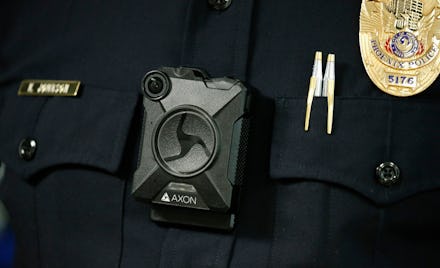California wants to prevent police body cams from becoming a racist form of public surveillance

Police body cameras were intended to serve the public by forcing accountability from police. But as facial recognition technology spread, it opened up the possibility of police turning body cameras into their own surveillance systems. Now, a new Californian law blocks facial recognition in body cameras, and it may inspire similar laws across the country.
After receiving bipartisan support in both chambers of the California Legislature, AB 1215: The Body Camera Accountability Act was signed into law by Governor Gavin Newsom. The law will go into effect on January 1, 2020 with a three-year sunset provision. That means it will automatically cease to have effect after three years unless action is taken to extend it.
Assemblymember Phil Ting (D-San Francisco) first introduced the bill earlier this year. The bill noted that the use of biometric surveillance like facial recognition would "corrupt" the purpose of body cameras "by transforming those devices from transparency and accountability tools into roving surveillance systems."
In addition, the bill compared facial recognition to requiring people to constantly show a personal identification card "in violation of recognized constitutional rights."
"#AB125 will keep inaccurate, biased, [and] invasive face/biometric surveillance from being used against the public in police body cameras, which were promised for police transparency and accountability," the American Civil Liberties Union of Southern California tweeted.
While it's hard to know the exact number of body cameras in use by police, the Washington Post reported that about half of the nation's 18,000 law enforcement agencies have some type of body-camera program.
Concerns around incorporating facial recognition into body cameras often draw from the technology's inability to read anyone who isn't a white man. In August, the ACLU found that facial recognition falsely matched 26 Californian legislators with mugshots. More than half of those falsely identified were people of color.
However, even if the technology was accurate, the history of policing and its targeting of vulnerable communities would have to be taken into account. As noted by Matt Cagle, Technology and Civil Liberties Attorney, ACLU of Northern California, "face recognition-enabled body cameras would facilitate massive violations of Californians civil rights."
"Without my bill, facial recognition technology essentially turns body cameras into a 24-hour surveillance tool, giving law enforcement the ability to track our every movement," Assemblymember Ting said. "Let's not become a police state and keep body cameras as they were originally intended — to provide police accountability and transparency."
Other organizations who supported the Body Camera Accountability Act included Color of Change, Council on American-Islamic Relations — California, Data for Black Lives, Fight for the Future, RAICES, and more.